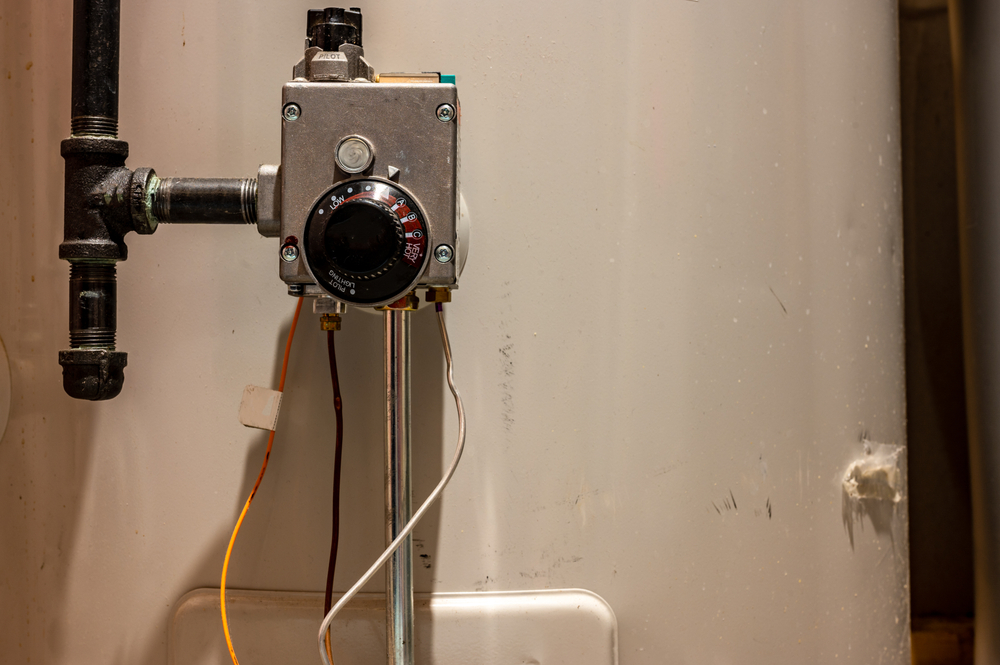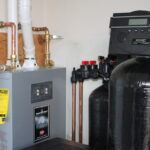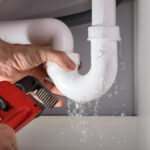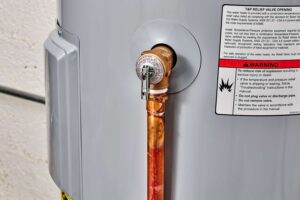
Is your water heater pilot light frequently going out? This common issue can be frustrating and may signal underlying problems with your water heater system. At Masterflo Plumbing, our water heater repair experts are well-versed in diagnosing and resolving such issues efficiently. First, ensure the gas valve is fully open and check if the propane tank is low. It’s also crucial to clear any debris from the pilot orifice and verify that the thermocouple is functioning correctly. Proper flame height adjustment and unblocked ventilation are essential for stable pilot light operation. Additionally, maintaining clear space around the pilot light and checking electrical connections are fundamental steps. With these insights from our experienced team, you can keep your water heater in optimal condition. Let’s dive into how you can tackle this problem and maintain a reliable hot water supply.
TLDR:
- Ensure gas supply is sufficient and free from blockages or leaks.
- Clean pilot orifice to remove dirt and debris obstructing gas flow.
- Inspect thermocouple for wear, corrosion, or misalignment.
- Adjust flame height accurately for steady blue flame.
- Confirm proper ventilation and positioning of the pilot light.
Insufficient Gas Supply
If your water heater pilot keeps going out, it could be due to a lack of gas supply. One common issue is that the gas valve may not be fully open. Check to make sure that the gas valve is turned all the way on. Sometimes, after maintenance or other work on the heater, the valve may not have been fully reopened. Additionally, if you have a propane heater, the tank may be running low or empty. Make sure to check the propane levels and refill if necessary.
Another reason for insufficient gas supply could be a problem with the gas line. There might be a blockage or a leak somewhere along the line, causing a disruption in the gas flow to the water heater. In this case, it is recommended to contact a professional canton, Ga plumber to inspect and repair the gas line. Remember, a consistent supply of gas is important for the proper functioning of your water heater’s pilot light.
Dirty or Clogged Pilot Orifice
Check for any debris or dirt that may be obstructing the pilot orifice of your water heater. A dirty or clogged pilot orifice can cause the pilot light to go out frequently. Over time, dust, dirt, or other particles can accumulate in the orifice, disrupting the flow of gas to the pilot light. This blockage can lead to an inconsistent flame or even cause the pilot light to extinguish altogether.
To address this issue, turn off the gas supply to the water heater and allow it to cool down completely. Once it’s safe to do so, locate the pilot assembly and inspect the orifice for any visible dirt or debris. Use a can of compressed air or a small brush to gently clean the orifice and remove any obstructions. Be careful not to damage the orifice while cleaning it.
After cleaning the pilot orifice, relight the pilot following the manufacturer’s instructions. If the pilot light continues to go out after cleaning the orifice, the issue may lie elsewhere, such as a faulty thermocouple.
Faulty Thermocouple
Inspect the thermocouple for signs of wear or damage as it could be the cause of your water heater pilot issues. A faulty thermocouple can prevent the pilot light from staying lit, leading to intermittent hot water supply. Here are some key points to take into account when dealing with a faulty thermocouple:
- Visual Inspection: Look for any visible signs of corrosion or damage on the thermocouple. If you notice any issues, it may be time to replace it.
- Positioning: Confirm the thermocouple is positioned correctly in relation to the pilot flame. Misalignment can cause the thermocouple to malfunction.
- Testing: Use a multimeter to test the thermocouple for proper functioning. If it does not generate the expected voltage when heated, it may need to be replaced.
- Replacement: If all else fails, contemplate replacing the thermocouple with a new one. This is a relatively simple and cost-effective solution to resolve pilot light issues caused by a faulty thermocouple.
Improperly Adjusted Flame
Verify the flame on your water heater is accurately adjusted to prevent problems with your pilot light remaining lit. If the flame is too high or too low, it can impact the pilot light’s ability to stay lit. An improperly adjusted flame may lead to issues such as the pilot light going out frequently, causing frustration and inconvenience.
To adjust the flame, locate the burner assembly on your water heater. There should be a knob that allows you to modify the flame height. Follow the manufacturer’s instructions for your specific model to guarantee the flame is set to the correct height. Typically, the flame should be a steady blue color and should not flicker or sputter.
If you are uncertain how to adjust the flame properly or if you continue to experience pilot light issues after modifying it, consider contacting a professional water heater repair plumber in Canton, Ga or technician for assistance. They can help make sure that your water heater is functioning correctly and safely.
Airflow Issues
For the proper operation of your water heater, pay attention to potential airflow issues that can impact the performance of the pilot light. Here are some common airflow issues to look out for:
- Ventilation Blockage: Confirm that the area around your water heater is free from any obstructions that could block proper airflow.
- Dirty Air Filter: Check if the air filter in your water heater is soiled or clogged, as this can hinder airflow and affect the pilot light.
- Proper Combustion Air: Make sure that the combustion air intake is not obstructed or limited, as this can lead to poor airflow and pilot light problems.
- Room Ventilation: Adequate ventilation in the room where the water heater is located is essential for maintaining good airflow and preventing pilot light issues.
Water Heater Age
Consider the age of your water heater as an important factor in determining its efficiency and potential issues. As water heaters age, their components may wear out, leading to decreased performance and reliability. Most traditional tank water heaters have a lifespan of about 8 to 12 years, while tankless water heaters can last up to 20 years with proper maintenance.
An older water heater may struggle to maintain a consistent pilot light due to the accumulation of dirt, rust, or sediment in the system. This buildup can hinder the proper functioning of the pilot assembly, causing it to go out frequently. Additionally, as water heaters age, their insulation may deteriorate, leading to heat loss and increased energy consumption.
Regular maintenance and inspection can help extend the lifespan of your water heater. However, if your water heater is reaching the end of its expected lifespan, it may be more cost-effective in the long run to replace it with a newer, more efficient model.
High Gas Pressure
If experiencing issues with your water heater pilot, high gas pressure could be a critical cause leading to irregularities in its operation. Here’s how high gas pressure can affect your water heater pilot:
- Flame Instability: High gas pressure can cause the pilot flame to become unstable, leading to flickering or a weak flame that may go out frequently.
- Overheating: Excessive gas pressure can result in the water heating beyond its set temperature, triggering the safety mechanisms to shut off the pilot light.
- Thermal Stress: The high gas pressure can subject the components of the pilot assembly to increased thermal stress, potentially causing malfunctions.
- Safety Concerns: Operating the water heater with high gas pressure can pose safety risks, such as gas leaks or even fires, necessitating immediate attention.
If you suspect high gas pressure as the underlying issue, it is essential to consult a professional technician to adjust the gas pressure to the manufacturer’s recommended levels for safe and efficient operation.
Ventilation Problems
A blocked or inadequate ventilation system can greatly impact the performance of your water heater pilot. Proper airflow is essential for your water heater to function efficiently. If the venting system is blocked or restricted, it can lead to a lack of oxygen reaching the pilot light, causing it to go out frequently. Additionally, poor ventilation can result in a buildup of harmful gases like carbon monoxide within your home, posing serious health risks to you and your family.
To guarantee your water heater operates safely and effectively, check that the ventilation system is free from obstructions such as debris, nests, or other blockages. Make sure the vent pipes are correctly installed, without any bends or dips that could impede the flow of air. Regularly inspecting and maintaining the ventilation system can prevent issues with your water heater pilot and promote better indoor air quality. If you suspect ventilation problems, it is essential to address them promptly to avoid further complications.
Pilot Light Positioning
Proper positioning of the pilot light is crucial for the best performance of your water heater. Here are some key points to keep in mind:
- Clearance: Guarantee that there is sufficient clearance around the pilot light. Objects too close can disrupt the flame or even extinguish it. Check the manufacturer’s guidelines for recommended clearances.
- Alignment: The pilot light should be correctly aligned with the thermocouple. Misalignment can cause the pilot light to flicker or go out frequently. Adjust the position carefully to ensure a steady flame.
- Cleanliness: Keep the area around the pilot light clean and free of dust or debris. Buildup can block the flow of gas or airflow, leading to issues with the pilot light. Regularly clean the pilot light assembly.
- Stability: Make sure the pilot light assembly is securely in place. Any loose fittings or components can cause the pilot light to go out intermittently. Check for stability and tighten any loose parts.
Electrical Issues
Check that your water heater’s electrical connections are secure to avoid potential issues with the system. Loose or faulty electrical connections can cause the pilot light to go out frequently. Start by ensuring that the power to the water heater is switched off before inspecting the electrical components. Check the wiring leading to the thermocouple, gas control valve, and pilot assembly. Look for any signs of fraying, corrosion, or damage. Tighten any loose connections using the appropriate tools. If you notice any damaged wires, consider replacing them to prevent further problems.
In addition to checking the connections, inspect the electrical panel or fuse box to verify that the circuit breaker associated with the water heater is functioning correctly. A tripped breaker can disrupt the power supply to the water heater, causing the pilot light to extinguish. Reset the breaker if necessary and monitor the water heater to see if the pilot light remains lit. By addressing these electrical issues promptly, you can help keep your water heater running smoothly.
Conclusion
Masterflo Plumbing is North Georgia’s most trusted plumbing company. With over 20 years experience and staffed with master plumbers, our team is equiped and ready to serve your plumbing needs. From water heater repair or replacement to minor and major plumbing problems, you can count on Masterflo Plumbing for your plumbing needs throughout Cherokee county and metro Atlanta. If your water heater pilot keeps going out, our expert plumbers can troubleshoot and address the issue promptly to ensure your water heater functions properly and safely. If you are unable to determine the cause or fix the problem yourself, it is best to consult our professional team for assistance.



